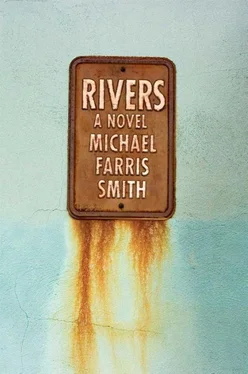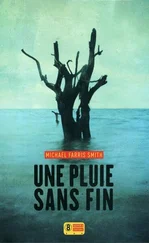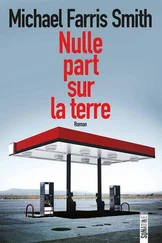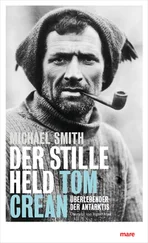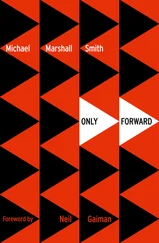Hours later Cohen woke and sat up. Massaged his shoulder. Wiped at his face with his hands and decided that he was going to get up and walk to that church and get his food. He was going to sit down and eat and drink the bottles of water and maybe the roof was still on the place and he would be able to put on dry clothes. “And when I’m done with all that,” he said to the dog, “we are getting the hell out of here.”
MARIPOSA HADN’T SLEPT AND HER jaw was sore from holding it clenched through the worst of the storm during the night. She stood and looked out but there was nothing new to see. There was enough light now, at least, and that was what she had been waiting on.
She had been sleeping with the large envelope she’d found in the bottom of the shoe box. Holding it, dreaming about it, imagining what was inside, not wanting to open it because she knew the reality of its contents would be a letdown. But her curiosity had won out and she had only been waiting for enough light so she could open it and see what it held and she discovered that she wasn’t disappointed.
There was a deed to a house and to land. A marriage license. His and her passport, each with a single stamp from Italy. There was a letter from the state of Mississippi, making an offer for his house and land. There was another letter, dated three months later, from the U.S. government, making a slightly larger offer for his house and land. There was another letter warning him to take the offer or risk losing full rights to the properties. And there was a final letter explaining that the time to accept an offer had passed but he could retain the rights to his house and land but that those rights would disappear once the Line became official, and in the event that the region ever regained its original status, rights would revert to him.
There was a death certificate. There were bank statements from closed accounts. There were letters from insurance companies claiming that, according to recent legislation, they were no longer responsible. There was a letter from a bank in Gulfport that confirmed a certificate of deposit in the name of the child. She noticed the dates on each of the letters or statements and everything went back three to five years.
She spent time with each document that came from the envelope. She read again and again, trying to put it together, their lives becoming more vivid now, the truth blending with the illusion of the memories in the shoe box. These people had been real, not simply whispers of romance that swirled away and landed safely somewhere else. Outside the rain fell and the wind pushed, but inside she was in another world, lost in Cohen’s creation.
TO WHOM IT MAY CONCERN—he is not dead he is risen.
Joe read it once. Twice. Three times. He sat up on the mattress, naked with a blanket across his legs. The white paper once clean and pure against the filth of his hands and fingernails but now smudged with the same filth. He had read it a hundred times over during the night as the rain and wind beat against the trailer. As the storm had dragged on and the winds became stronger, he drank harder and clenched his jaw tighter and by the light of the lantern he read that note over and over and over. By the end of the worst, he was no longer reading it but reciting it aloud, pacing across the short, narrow floor and rearing back his head and screaming it upward as if to join with the forces of nature. He is not dead he is risen! He is not dead he is risen! Turning up the bottle and reciting it louder and stripping off his clothes and falling drunkenly against the walls of the trailer as it rocked with the weather. Howling all night until the storm let go a little and the bottle was empty and then he fell face-first on the bed with the note clutched in his hand.
Joe sat on the bed with it now and thought of tearing it into a thousand pieces. But instead he held on to it as he got to his feet, put on his clothes, searched around and found a half bottle of water. He drank the water in one take and wiped his mouth on his shirtsleeve and then he walked outside.
Aggie stood under a tarp, drinking coffee and smoking a cigarette. A coffeepot sat on top of a small gas burner and Aggie poured Joe a cup as he walked over. Joe took it and cast his bloodshot gaze out at the rain. He coughed some and spit and rubbed at his forehead. “I want to go off and look around some.”
Aggie leaned over and took the Bible from his back pocket and turned it back and forth in his hands, its cover worn and soft like sheepskin. “Might wait until it lets up some.”
“I can’t. I can’t wait.”
Aggie drank the coffee. “You all right?”
“I’m all right. Just a rough night, you know.”
“Seemed like it.”
“I guess you slept through it.”
Aggie shrugged.
“I’m getting out for a while. You might let them out, too,” Joe said and he motioned his coffee cup at the locked doors of the trailers.
Aggie nodded. “Go on, then. Keep your eyes out for stragglers and whatever else. God knows who’s running around down here now. Take that Jeep.”
“All right,” Joe answered. He drank his coffee. Waited for any more instruction from Aggie but it didn’t come. Aggie stuck the Bible back in his pocket and he took the key ring from his belt loop. He picked out the key to the Jeep and he took it off and gave it to Joe. As Joe took it, one of the women began to beat on her trailer door and call out.
“That was a bad one last night. Let em breathe,” Joe said.
“I’ll worry about that.”
Joe shoved his hands down in his pockets. Pushed his boot heel into the ground. “It was a bad one last night and it’s been like one long bad one here lately.” He waited for Aggie to say something, but he didn’t. “Seems like it’s badder all the time. Don’t it?”
“Don’t feel much different to me.”
“I didn’t say it feels different. I said it is different.”
Aggie turned to him. “So?”
“So, all I’m saying is, we got a plan for if it gets too bad?”
“It ain’t gonna get too bad.”
“You don’t know that. I damn near shit the bed last night.”
“Then you need to get your shit together,” Aggie said. “This is where we are.”
Joe took a couple of steps back and forth, then said, “Fine.”
“You look stir-crazy. Go on out of here.”
Joe nodded, then said, “You got Mariposa and that boy locked?”
“Yep.”
“You better keep them that way.”
“How come?” Aggie asked, his tone gently patronizing.
“They both got that look here lately. They’ll get brave.”
“That boy is plenty smart enough to weigh the consequences. He listens when we read.”
“He listens but he’s got that look. And so does she.”
“She,” Aggie said and he stopped. Thought about her and her amber skin and her wavy black hair and the look in her eyes. “She is just right.” He tossed the cigarette. “See what you can see,” he said.
Joe nodded and walked back to the compound and into his trailer. He opened up a beer and drank it fast. Let out a grunt when he was done. Then he picked up a towel off the bed and wiped his face and he put on a pair of work gloves and a black sock hat and a coat with a hood. Before he walked out, he grabbed his newly acquired sawed-off shotgun and he took a fistful of shells and stuck them in his coat pocket. He walked out and across the red mud and saw them beginning to peek out from behind the curtains, like they did every morning. Their doors locked from the outside. The pale, exasperated faces in the dirty windows. The sunken eyes. Wondering if he was making the rounds and unlocking the doors. Wondering if they would be allowed outside. Wondering if this would be one of the days when they were allowed to be human. Wondering why they couldn’t have just been blown away.
Читать дальше
